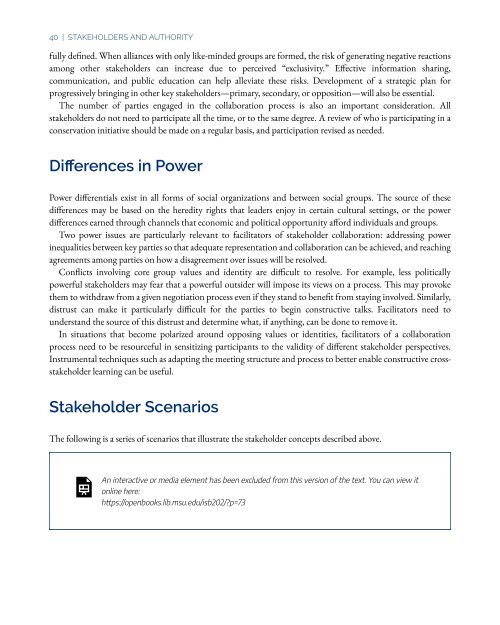An Interactive Introduction to Organismal and Molecular Biology, 2021
An Interactive Introduction to Organismal and Molecular Biology, 2021
An Interactive Introduction to Organismal and Molecular Biology, 2021
Create successful ePaper yourself
Turn your PDF publications into a flip-book with our unique Google optimized e-Paper software.
40 | STAKEHOLDERS AND AUTHORITY<br />
fully defined. When alliances with only like-minded groups are formed, the risk of generating negative reactions<br />
among other stakeholders can increase due <strong>to</strong> perceived “exclusivity.” Effective information sharing,<br />
communication, <strong>and</strong> public education can help alleviate these risks. Development of a strategic plan for<br />
progressively bringing in other key stakeholders—primary, secondary, or opposition—will also be essential.<br />
The number of parties engaged in the collaboration process is also an important consideration. All<br />
stakeholders do not need <strong>to</strong> participate all the time, or <strong>to</strong> the same degree. A review of who is participating in a<br />
conservation initiative should be made on a regular basis, <strong>and</strong> participation revised as needed.<br />
Differences in Power<br />
Power differentials exist in all forms of social organizations <strong>and</strong> between social groups. The source of these<br />
differences may be based on the heredity rights that leaders enjoy in certain cultural settings, or the power<br />
differences earned through channels that economic <strong>and</strong> political opportunity afford individuals <strong>and</strong> groups.<br />
Two power issues are particularly relevant <strong>to</strong> facilita<strong>to</strong>rs of stakeholder collaboration: addressing power<br />
inequalities between key parties so that adequate representation <strong>and</strong> collaboration can be achieved, <strong>and</strong> reaching<br />
agreements among parties on how a disagreement over issues will be resolved.<br />
Conflicts involving core group values <strong>and</strong> identity are difficult <strong>to</strong> resolve. For example, less politically<br />
powerful stakeholders may fear that a powerful outsider will impose its views on a process. This may provoke<br />
them <strong>to</strong> withdraw from a given negotiation process even if they st<strong>and</strong> <strong>to</strong> benefit from staying involved. Similarly,<br />
distrust can make it particularly difficult for the parties <strong>to</strong> begin constructive talks. Facilita<strong>to</strong>rs need <strong>to</strong><br />
underst<strong>and</strong> the source of this distrust <strong>and</strong> determine what, if anything, can be done <strong>to</strong> remove it.<br />
In situations that become polarized around opposing values or identities, facilita<strong>to</strong>rs of a collaboration<br />
process need <strong>to</strong> be resourceful in sensitizing participants <strong>to</strong> the validity of different stakeholder perspectives.<br />
Instrumental techniques such as adapting the meeting structure <strong>and</strong> process <strong>to</strong> better enable constructive crossstakeholder<br />
learning can be useful.<br />
Stakeholder Scenarios<br />
The following is a series of scenarios that illustrate the stakeholder concepts described above.<br />
<strong>An</strong> interactive or media element has been excluded from this version of the text. You can view it<br />
online here:<br />
https://openbooks.lib.msu.edu/isb202/?p=73


















